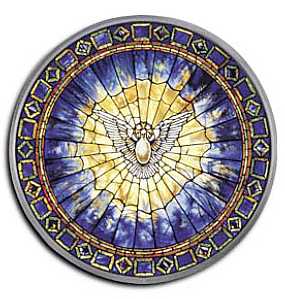 Three weeks ago in church, one of our elders quoted T.D. Jakes.
Three weeks ago in church, one of our elders quoted T.D. Jakes.
My head nearly exploded.
You see, T.D. Jakes is a cult leader. He’s not a Christian—at least by the standards of orthodoxy. As a leader in a Oneness Pentecostal church group, he denies the classical understanding of the Trinity. (See update below.) Yet Jakes shows up on numerous “approved” lists of Evangelicals that circulate on the Web and in print media. Just the other day, our YMCA (an organization championed by historic Christian evangelist Dwight Moody) held a book sale to raise money. One table included Christian materials. I suspect a quarter of the books had Jakes’s doughy, smiling face on the cover.
A few days later in one of our small groups, someone mentioned a book by another Oneness Pentecostal without understanding the theology. He’d never heard of them or their beliefs.
In my younger days, cults crawled out of the woodwork. Mo Berg, Victor Paul Weirwille, Herbert Armstrong—we knew these guys and knew to stay far away from their pernicious brands of deviancy. I used to spend hours reading up on Jehovah’s Witnesses and the Mormons just so I could show them the truth.
Now you’ve got Mormon books showing up in Christian bookstores and Mitt Romney giving the commencement address at Pat Robertson’s Regent University.
Times were that the marks of a cult stood out like a sore thumb. Three doctrinal denials will usually reveal a cult:
- Denial of the Trinity
- Denial of the efficacy of Christ’s blood to cleanse from all sins
- Denial of the sufficiency of faith in Christ alone for salvation
Apply those three to any religious organization or leader and they’ll snare cultists with an efficiency close to 100 percent.
In most cases, you don’t have to go any further than looking for a group’s flawed view on the Trinity to unmask it as a cult. Nothing marks the uniqueness of orthodox Christianity than the belief that God exists in three full, unique persons in one essence. We believe the unity of the Godhead in essence, the Godhead’s diversity in persons. And we’ve believed that fundamental understanding of the nature of God since the founding of the Church by Christ Himself.
How fundamental? As I see it, every doctrine we hold dear in the Church must begin with the nature of God Himself. If we fumble that, everything that proceeds from it takes on a warped perspective. For instance, the very love of God cannot be properly understood from a Oneness perspective, for the love the members of the Trinity possess for each other expresses itself in God’s love for us and our love for each other. Our concept of what love means can only be fully understood if we acknowledge that God is Trinitarian in nature.
In fact, I can’t see how anyone can possible read the Bible and not see the Trinity on every page. Consider even Deuteronomy 6:4—Hear, O Israel: The LORD our God, the LORD is one—the word “one” there is not the word for a single person (yahid), but a unified personna (ehad). We see the same word ehad in reference to husband and wife being one (ehad) flesh. How appropriate that the ecstatic love the Triune God experiences within His persons reflects in the joining of husband and wife, while also mirroring the unification of Christ and the Church in the imagery of Bridegroom and Bride. I’m also one who believes that Man is a tripartite being (body, soul, spirit) in the same way that God is triune, further reflecting the idea that we are made in the image of God.
Just inches away on my library shelf sits James White’s The Forgotten Trinity. Check it out. For more on the error of Oneness (historically known in several minor variants as Sebellianism, Patripassionism, or Modalism), check out Theopedia.
I spoke with the elder Sunday morning about his reference. He wasn’t familiar with Oneness Pentecostals, their beliefs, or the fact that T.D. Jakes is a non-Trinitarian. He expressed surprise about Jakes and he staunchly defended Trinitarianism. While I wasn’t happy about the Jakes quote, I absolutely understood the elder made the comment without knowing the truth about Jakes.
This brings us to the meat of this post.
So why do we diss discernment? The elder made a telling statement as we talked, “There are so many variants of Pentecostalism, it’s hard to know exactly what each believes.” That’s a legitimate comment on Pentecostalism—and Christianity in general. So much fracturing and splintering over a couple millennia have left us all a bit strung out. When the Lord speaks to the seven Churches in Asia in Revelation, it’s hard to miss the different flavors of practice and belief already evident.
I’ve made the Church my study, but I still can’t tell you what the Ukrainian Orthodox believe differently from the Russian Orthodox. Or Regular Baptists from Bible Baptists. I could give you generalities, but generalities won’t cut it when trying to discern truth from error.
The sheer mass of Christian (and pseudo-Christian) thought multiplied over thousands of belief statements is daunting. No wonder so many Christians appear baffled. Still, we can’t excuse our lack of diligence.
In the charismatic and pentecostal ranks, you tend to see a lot of cult of personality issues. Folks get sidetracked by big name preachers and ministries. Prophets, apostles, deacons, elders, pastors—stick a title on someone (usually self-affixed by the Christian celebrity in question) and you’ll find people who immediately succumb to slavish devotion. Obviously, the chance for delusion runs high. Sadly, once a leader proves to have feet of clay, the defrauded simply move onto another hero. Lather, rinse, repeat.
Folks outside charismatic and pentecostal circles will, of course, laugh and mock any follower of Benny Hinn or Jack Van Impe, but those mockers aren’t immune to deception. My experience shows that rather than falling prey to dynamic individuals, the noncharismatics/Pentecostals fall for an even more insidious lie: power structures and systems. They get sucked into thinking governments, organizations (Christian or not), and even church hierarchies are the means by which the world revolves. The faithful tack a veneer of godliness over the top of power structures, but the core’s still ungodly. These folks end up perpetrating great injustices against the poor, disenfranchised, powerless, and even each other, as a result.
Don’t laugh at someone else, because I can promise that all of us have drunk (or are still drinking) from some soul-corroding teat. Even the best of us get off-track or stumble in little ways. Let’s all be humble here.
I talk about discernment quite a bit on Cerulean Sanctum. On the whole, I think it’s the greatest lack in the Church today. I think five reasons drive this:
- We’re too busy – Busy people nod their heads and unthinkingly accept whatever comes their way. That’s a recipe for disaster. While the sheer number of lies out there overwhelms the average person, God still holds us accountable for truth.
- We’re too apathetic – “Does discernment matter? Why should I care?” Paul warns that many have shipwrecked their faith by lack of discernment. Rank pragmatism within many Christian hearts pushes discernment into the background because its raison d’être doesn’t immediately leap out. We don’t understand that God’s people perish for lack of knowledge and that this knowledge is beneficial for own its sake—because God said we need to know it.
- We think we’ve arrived – We’re saved now, so what? But eternal security isn’t license for spiritual sloth. Too many Christians think they’re in, but then fail to work out their salvation with fear and trembling. That fear and trembling includes godly discernment.
- We’re naïvely optimistic – Jesus didn’t tempt God by taking a leap off the top of the Temple. The same Enemy that tempted the Lord tempts us. He’s a master at deceiving us into thinking we’re immune from the mess our neighbors made of their lives. It never dawns on us that we could go down in flames, too. So when the Enemy tells us to jump off, we do. That’s pride, and it’s from the pit of hell.
- We’re not drilled on discernment – People quote 1 John 1:4 (Beloved, do not believe every spirit, but test the spirits to see whether they are from God, for many false prophets have gone out into the world), but it’s always for some other person in some other church at some other time. Our church leaders should have that 1 John 1:4 filter up at all times and show us how to keep it up as well.
As for me, I side with Jesus here:
Now when he was in Jerusalem at the Passover Feast, many believed in his name when they saw the signs that he was doing. But Jesus on his part did not entrust himself to them, because he knew all people and needed no one to bear witness about man, for he himself knew what was in man.
—John 2:23-25
In this day and age, it’s foolish for any Christian to go blindly out into the world. Jesus had His filter on at all times. He knew the evil that lurked in the hearts of men, so He did not trust them.
That’s wisdom for us, folks. Begin at skepticism. Never assume someone is telling you the truth, no matter how trusted that teacher/leader/pastor/friend might be. Let God alone be true and every man a liar (Romans 3:4). The Scriptures are our source. The Holy Spirit is our interpreter. Run everything you hear past those two. Any human is capable of error, even this writer. Don’t take everything I say as gospel truth. Prove it against the Word of God. Correct me if I need it. I expect nothing less.
Thanks to all who contributed. I’ll unpack some of your comments from Friday’s post tomorrow.
(Update: I made an error in currently assigning Jakes to the United Pentecostal Church. He was once affiliated with that Oneness church, was ordained a bishop in another Oneness denomination, and currently is a high-ranking leader within another Oneness church group. I regret the error.)
 Community existed, religious practice existed, love existed, service existed, even the Scriptures existed, but the Holy Spirit did not make his dwelling place in human beings.
Community existed, religious practice existed, love existed, service existed, even the Scriptures existed, but the Holy Spirit did not make his dwelling place in human beings.
 we’re that second pig. Wood makes a fine house save for encounters with F5 tornadoes and wolves of unusual lung capacity. But that pig was still foolish.
we’re that second pig. Wood makes a fine house save for encounters with F5 tornadoes and wolves of unusual lung capacity. But that pig was still foolish. Three weeks ago in church, one of our elders quoted T.D. Jakes.
Three weeks ago in church, one of our elders quoted T.D. Jakes.